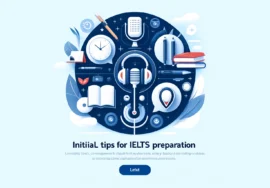
How to Improve Your IELTS Speaking Skills
Improve your speaking skills for the IELTS exam with practical tips and effective strategies. This article provides methods to enhance fluency and boost your confidence for the IELTS speaking test.
How to Improve Your IELTS Speaking Skills
Improving your IELTS Speaking skills requires a combination of consistent practice, focused strategies, and the right mindset. The Speaking section of the IELTS test assesses how well you can communicate in English, testing your fluency, pronunciation, grammar, and vocabulary. To succeed, it’s essential to be well-prepared for the test format, practice effectively, and develop confidence in speaking. This article will guide you through some effective ways to enhance your speaking skills, including the common topics covered in the Speaking section, techniques to boost your fluency and pronunciation, ideal answers to sample questions, and the importance of body language and confidence.
1. Common Topics in the Speaking Section

The IELTS Speaking test is divided into three parts, and each part covers different topics that test your ability to speak about various subjects. Familiarizing yourself with common topics will help you prepare for the exam and increase your comfort level during the test.
Part 1: Introduction and Interview (4-5 minutes) In this section, the examiner will ask you general questions about yourself, such as your name, background, hobbies, studies, and daily routine. Common topics include:
- Personal Information: Your name, where you are from, your family, and your job or studies.
- Daily Life and Routine: How you spend your time, what you do on weekends, and your hobbies.
- Travel and Leisure: Places you like to visit, your favorite holidays, and types of vacations you enjoy.
Part 2: Long Turn (3-4 minutes) In this part, you will receive a cue card with a topic. You will have one minute to prepare before speaking for 1-2 minutes about the topic. Common topics include:
- Describing an event: A memorable experience, a special celebration, or a holiday.
- People: A person you admire, a friend, or a family member.
- Places: A place you’d like to visit or a place you’ve already been to.
Part 3: Discussion (4-5 minutes) In the final part, the examiner will ask more in-depth questions based on the topic from Part 2. You will need to provide detailed responses and express your opinions. Common topics include:
- Technology: How it affects our lives, the role of technology in education.
- Education and Learning: The importance of education, online vs. traditional learning.
- Society and Environment: Environmental issues, cultural differences, and social changes.
2. Techniques to Enhance Fluency and Pronunciation

Fluency and pronunciation are critical elements of the IELTS Speaking test. Here are some techniques to help you improve these skills:
A. Fluency: Fluency refers to the ability to speak smoothly without unnecessary pauses. To improve your fluency:
- Practice Speaking Regularly: Engage in daily speaking practice to build confidence and avoid hesitation. Speak on a variety of topics, even if you’re just talking to yourself or repeating what you’ve read.
- Use Fillers Strategically: Instead of pausing or saying “um,” use fillers like “Well,” “Let me think,” or “That’s an interesting question” to give yourself time to gather your thoughts.
- Focus on Thought Groups: Break your speech into short thought groups. This will help you speak more naturally and make it easier to manage your ideas during the test.
B. Pronunciation: Clear pronunciation is key to being understood. Here’s how to improve:
- Record Yourself: Listening to recordings of your speech can help you identify areas where you need improvement. Compare your speech to native speakers and try to adjust your pronunciation.
- Learn Phonetic Symbols: Understanding how words are pronounced can be made easier by learning the International Phonetic Alphabet (IPA). This will help you better understand the sounds of English.
- Stress and Intonation: English uses stress and intonation patterns to convey meaning. Practice stressing the important words in sentences and using appropriate intonation to sound more natural.
3. Sample Questions and Ideal Answers

To prepare for the IELTS Speaking test, it’s important to practice with sample questions. Here are some common questions and tips for crafting ideal answers.
Part 1 Example Questions:
- What do you do in your free time?
- Ideal Answer: “In my free time, I enjoy reading books, particularly novels. I also like going for walks in the park and meeting up with friends. It helps me relax and recharge for the week ahead.”
Part 2 Example Question:
- Describe a memorable event you attended.
- Ideal Answer: “One of the most memorable events I attended was my graduation ceremony. It was a proud moment for me as I had worked hard for my degree. The ceremony was held at a beautiful hall, and my family was there to support me. I felt so happy to share that special day with the people I love.”
Part 3 Example Question:
- Do you think it’s important to travel to different countries? Why or why not?
- Ideal Answer: “Yes, I believe traveling to different countries is essential because it broadens your perspective and helps you understand diverse cultures. It also allows you to learn new languages and gain a deeper appreciation for the world. Traveling enhances your personal growth and enriches your life experiences.”
4. The Role of Body Language and Confidence in Speaking

Body language plays an important role in communication. Although IELTS Speaking focuses on your spoken English, your posture, facial expressions, and hand gestures can help convey confidence and clarity. Here’s how body language affects your speaking performance:
- Maintain Eye Contact: Looking at the examiner shows confidence and helps establish a connection.
- Sit Up Straight: A good posture reflects self-assurance. Slouching or appearing distracted can make you seem less engaged.
- Use Hand Gestures Sparingly: Gestures can help emphasize your points, but overdoing them can be distracting.
Building confidence is equally important. When you feel confident, your speech becomes more fluid, and you’re less likely to be affected by nerves. To boost confidence:
- Practice Speaking with a Timer: Set a timer and speak on a topic for one or two minutes. Gradually increase the duration to get comfortable with time constraints.
- Positive Affirmations: Remind yourself that you are capable and have prepared well. A positive mindset can reduce anxiety.
5. How to Practice Speaking with a Partner or Tutor

Practicing with a speaking partner or a tutor is one of the best ways to improve your skills. Here’s how you can make the most of these sessions:
A. Practicing with a Partner:
- Set a Speaking Schedule: Plan regular speaking sessions with a partner. This helps create consistency and allows you to track your progress.
- Role Play: Take turns being the examiner and the test-taker. Practicing questions and responses in a simulated environment will make you feel more comfortable during the actual exam.
- Give Constructive Feedback: If your partner is willing, provide constructive feedback on areas like grammar, vocabulary, and pronunciation.
B. Practicing with a Tutor:
- Focus on Weak Areas: Work with a tutor to identify your weak points, whether it’s fluency, grammar, or pronunciation, and focus on improving those areas.
- Take Mock Tests: Tutors can provide mock IELTS Speaking tests that mimic the actual exam conditions, allowing you to practice under time pressure.
- Learn Speaking Strategies: A tutor can teach you strategies like how to organize your thoughts quickly, how to deal with challenging questions, and how to give clear, detailed responses.
Conclusion
Improving your IELTS Speaking skills is a gradual process that requires dedication and practice. By familiarizing yourself with common topics, enhancing your fluency and pronunciation, practicing ideal answers, and paying attention to your body language, you can significantly increase your chances of achieving a high band score. Practicing with a partner or tutor can further help you refine your skills and gain the confidence needed to excel in the test. Remember, consistency is key – the more you practice, the more confident and prepared you’ll be for your IELTS Speaking test.








